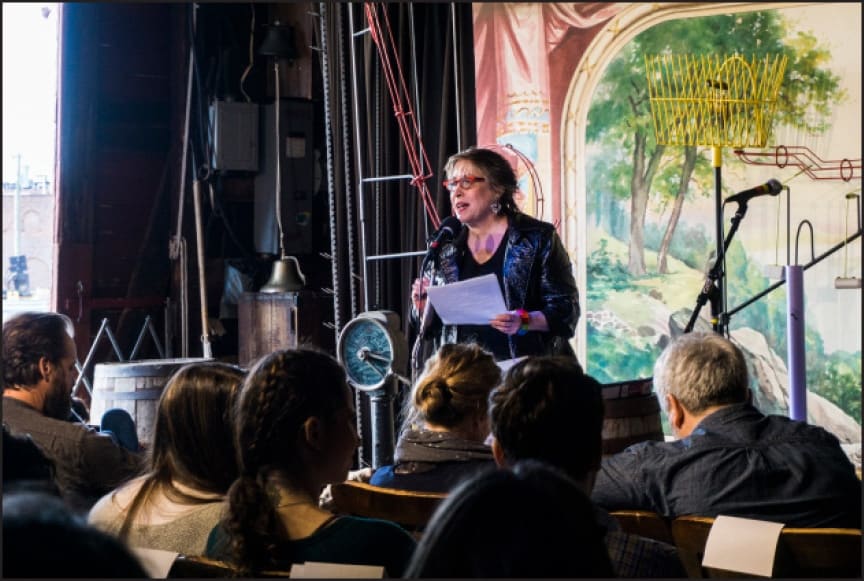 Katherine Lanpher leans against the pier’s railing in front of the Waterfront Barge Museum. The Statue of Liberty is behind her in the distance. It is a beautiful Saturday evening, but slightly chilly. She takes a deep breath and reads from the paper before her:
Katherine Lanpher leans against the pier’s railing in front of the Waterfront Barge Museum. The Statue of Liberty is behind her in the distance. It is a beautiful Saturday evening, but slightly chilly. She takes a deep breath and reads from the paper before her:
I believe in those wing’d purposes,
And acknowledge red, yellow, white, playing within me,
And consider green and violet and the tufted crown intentional,
And do not call the tortoise unworthy because she is not something else,
And the jay in the woods never studied the gamut, yet trills pretty well to me,
And the look of the bay mare shames silliness out of me.
She looks up, beaming.
“You could just read that once a day, and be a better person,” she says.
Those words were written by Walt Whitman, a well-loved Long Island-born poet. He celebrated birth and death, cities and nature, America and the cosmos, and everything else in between or otherwise in his poem Song of Myself. The famous poem was written and rewritten multiple times between 1855 and 1892.
The evening of May 20, 29 poets, writers, musicians, and others read all 52 cantos of the poem to each other and an audience on the gently rocking wooden barge. It was a fitting venue for the reading, as both the poem and the boat bear lively testament to the eternal and heroic in America’s past and present.
“I feel like I’m at a communal worship of the things that I admire about this country,” said Lanpher, who read Canto 13. “This is church for me. A communal reading of a poem? I can’t think of anything more beautiful. Especially in this setting. Whitman reminds us of what’s possible, and what’s always been meant to be for this country, if you decide to believe in the dream.”
A special comfort
The fundraiser supported the Waterfront Barge Museum, Sunny’s Bar, the American Civil Liberties Union, PEN America, and the National Endowment for the Arts. The event was organized by filmmaking team Micah Garen and Marie-Hélène Carleton, of Four Corners Media, a documentary production company based in the Fairway building.
“We’re celebrating Walt Whitman, who was a visionary,” Carleton told the audience. “Reading on a barge is also a very Whitman-esque activity… He thought that where you read made a big difference to how you understood something. Rather than reading indoors or in libraries, he liked to go to the country or the Long Island seashore and read books.”
Garen also emphasized the element of tradition in the reading. The idea for the event was born while he and Carleton were working on a documentary about funeral practices in Canada. In the course of their work, they came across a communal reading of Song of Myself in Northern Michigan. Those organizers in a small rural library , in turn, had borrowed the idea from someone else.
“Celebrating art and life and ourselves is even more important in this political climate,” Garen said.
As documentary filmmakers focusing on social issues, the duo are both quite attuned to the political climate. In addition to their films about the refugee crisis, the archeological and cultural despoiling of Iraq following the American invasion in 2003, and other conflict reports, they co-wrote American Hostage: A Memoir of a
Journalist Kidnapped in Iraq and the Remarkable Battle to Win His Release. The book told the story of Garen’s kidnapping and eventual release by Shia extremists in 2004.
Garen and Carleton read one canto of Song of Myself each – the others were read by nearly three dozen of their creative-minded friends and contacts, such as WNYC personality John Hockenberry, actress Maggie Gyllenhaal, and Hungarian writer Péter Zilahy. His book, The Last Window-Giraffe, is sometimes credited as an inspiration for the Orange Revolution in Ukraine in 2004.
Clarence Bucaro, a musician who lives in the Columbia Waterfront District and read Canto 11, said that the audience, which contained around one hundred people, most of whom stayed for the length of the reading, was wonderful. “It’s a lovely group of people. Anyone who’s willing to do three hours of Walt Whitman reading is pretty cool.”
Lanpher agreed. “The energy’s great. People are really listening. They’re really listening. I feel like I’m at a communal worship of the things that I admire about this country,” she said. “I think Whitman is always relevant. I think he’s more universal than [this political climate], and yet I think we derive an especial comfort from him right now. This is a man who says, ‘I take it all. I take it all; it all is me.’ ”








